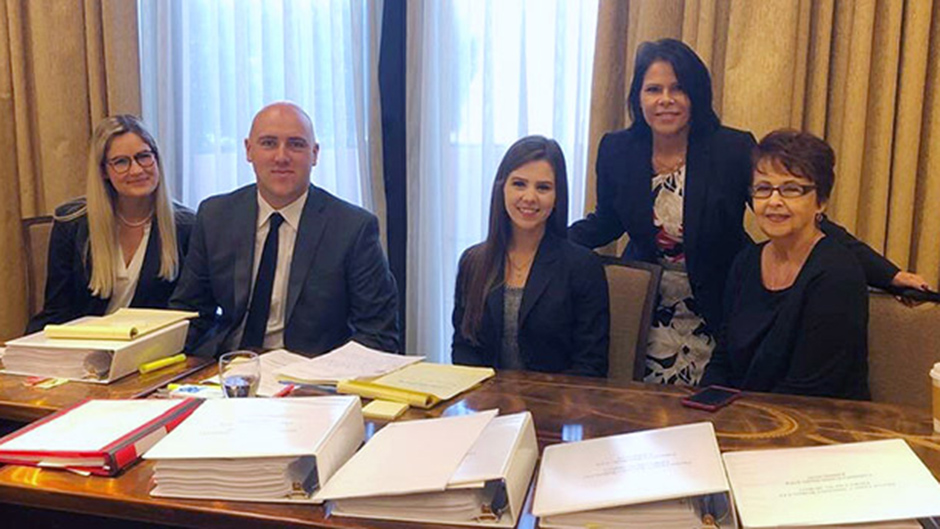Last September, 3Ls Taylor Bandy, Brooke Nelson, and Theodore O’Brien – student fellows with Miami Law’s Investor Rights Clinic – traveled to Tampa, Florida, to handle a four-day arbitration on behalf of the IRC’s client, Theresa Taylor. The IRC filed an arbitration claim on her behalf in early 2017 before the Financial Industry Regulatory Authority, after she lost her entire retirement savings of $40,000 at the hands of a now-defunct, unregistered investment adviser.
Defrauded by Investment Advisor
Taylor is a 76-year-old retiree and resident of Spring Hill, Florida. She worked at
JC Penny in the catalog department for over 18 years. During that time, she accumulated about $40,000 in her 401(k). After she retired, her tax preparer, Michael DeBoer, convinced her to roll over her 401(k) so he could manage her account, claiming he could do better for her. He presented her with completed paperwork to open an individual retirement account at Interactive Brokers, LLC, an online discount brokerage firm.
Unbeknownst to Taylor, the paperwork granted an unregistered investment adviser, Camilo Skinner, trading authority over her account. Skinner was making undisclosed payments to DeBoer in exchange for customers. FINRA in fact, barred DeBoer from the securities industry for referring at least 28 investors to Skinner, who collectively lost nearly $2 million in the fraudulent scheme.
Turning to Investor Rights Clinic for Help
Taylor sought legal assistance from the IRC, which represents low-income investors who have claims too small to find legal representation. Under the supervision of the clinic’s attorneys, a team of second and third-year law students reviewed Taylor’s case and filed an arbitration claim on her behalf against Interactive Brokers, the brokerage firm that provided Skinner with a “turnkey” trading platform that allowed him to trade highly speculative futures and options on behalf of dozens of investors (mostly retirees), including Taylor.
The IRC alleged that Interactive Brokers failed to conduct due diligence before giving Skinner access to customer accounts, failed to comply with industry rules requiring that the firm know its customers and supervise its business model, and that it facilitated, aided, and abetted Skinner’s misconduct.
Miami Law Students Gain Research + Trial Skills Working on Case Since 2017
Over the course of nearly two years, student interns conducted arbitrator selection, worked with experts who donated their time and provided testimony at the arbitration, handled prehearing conferences, discovery, and argued contested motions. Having worked on Taylor’s case as IRC student interns, fellows Bandy, Nelson, and O’Brien returned to the clinic this fall to try her case in Tampa. During the arbitration hearing, the student fellows handled all aspects of the case.
“The arbitration hearing was an extraordinary opportunity to practice trial skills before an arbitrator,” said O’Brien. “I conducted direct and cross-examinations, introduced exhibits, made objections, and delivered a closing argument. Thanks to the IRC, I will graduate with this rare practical experience under my belt.”
“It was a surreal opportunity to sit in the first chair when it was my witness to question,” said Nelson. “I know I won’t have that opportunity again for quite some time and it is one I’m going to be working towards in the years to come.”
Bandy agreed, explaining that “the opportunity to serve as co-lead counsel was a rewarding and distinctive opportunity. This experience was unique in that many young associates are not given the level of discretion we were afforded in preparing for and participating in the hearing.” As to providing direct client services, Bandy explained that “working directly with our client instilled the importance of pro bono work. The gratitude our client expressed made all of the hours preparing for the arbitration all the more rewarding.”
Acquiring Background in Legal Principles Governing Financial Professionals
During the course of their work on Taylor’s case, the students also learned about the substantive legal principles governing financial professionals who provide investment advice to investors, and the challenges small investors face when they have lost their retirement savings due to their broker or adviser’s misconduct.
“Being able to speak with Mrs. Taylor and learn her story was absolutely humbling,” Nelson explained. “It was shocking to learn that her story was not unique; dozens of other people had been taken advantage of by the same adviser at the same firm.”
A single Tampa-area arbitrator heard Taylor’s claim. In a short “award” issued on October 31st, the arbitrator ruled in favor of Interactive Brokers and denied Taylor’s claims, without an explanation of his ruling.
“Most arbitration awards do not provide an explanation, but rather, simply state whether the claim is granted or denied, and how fees are assessed,” explained Teresa Verges, the IRC’s Director. “While we are disappointed that Mrs. Taylor did not prevail, this case presented legal challenges due to the unique business model of the firm.”
“The law school clinic took my case when no one else would,” said Taylor. “I am eternally grateful for their work on my behalf.” She continued, “I want people, especially among the older generation, to be aware of what could happen to their savings when they trust the wrong firm or professional.”
*************************************
More on the Investor Rights Clinic:
Miami Law’s IRC is the only securities arbitration clinic in Florida providing free assistance to small claim investors. The clinic opened its doors in January 2012 after receiving a limited grant from the FINRA Foundation. Since opening, the IRC has recovered over $1.2 million on behalf of low-income investors. IRC student interns have also conducted financial outreach events throughout South Florida, drafted comment letters on FINRA rule proposals, and drafted articles regarding the latest financial news impacting investors and securities arbitration, posted on the clinic’s blog at http://investorrights.law.miami.edu.

